The internet plays an important role in keeping in touch with loved ones both near and far.
One-third (33%) of online adults say that the internet has improved their connections with friends “a lot,” and nearly one-quarter (23%) say that it has greatly improved their connections with members of their family. By contrast, far fewer say their internet use has improved their capacity to make new friends: only 12% of internet users feel that the internet has greatly improved their ability to meet new people, and nearly two thirds (64%) say that it has not improved their ability to meet new people at all.
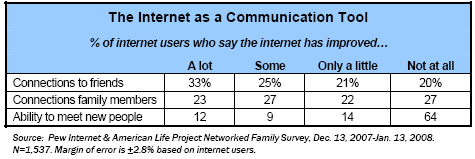
Adults of all ages see the internet as an important tool for maintaining connections with family members, but young people are far more likely than older adults to go online in order to keep in touch with existing friends and make new contacts.6
As early and avid adopters of social networking, instant messaging and other social media applications, the internet is a key tool for young people to communicate, meet new friends and keep in touch with old ones:
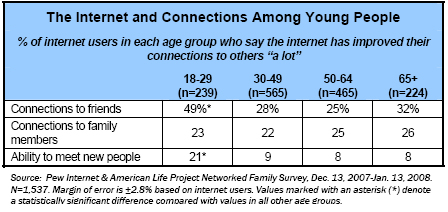
The internet has led to more time working from both the home and office.
Most people view the internet as having a relatively minor influence on the amount of time that they spend on various activities. The primary exceptions are working and watching TV. For many internet users, new communication tools have led to an increase in the time they spend working, whether that work is done at the office or at home. One in five employed internet users (19%) say that using the internet has increased the amount of time they spend working from home, and one in ten (11%) say that it has increased the amount of time they spend working from the office.
Despite the large number of people who now work from home, the blurring of work and family life has surprisingly few quantifiable effects with respect to the ways workers spend their private time. Individuals who work at home at least occasionally and those who are employed but do not work from home are similar in terms of their satisfaction with their time for family, friends and hobbies; the amount of time they spend with other household members; their tendency to socialize with others; and the perceived closeness of their family.
Where employment plays a role (such as in less satisfaction with the amount of time spent on hobbies or relaxation), the key difference is between those who are employed and those who are not—there is little difference between those who work from home and those who do not do so. One notable exception is the difference in time spent having dinner with family members. Among those who are employed and live with a spouse or child, 63% of those who do some work from home every day say they also have dinner with family members daily. By contrast, 48% of those who are employed but do not work from home every day have dinner with family members daily.
Roughly nine in ten internet users say that the time they spend online has had no impact on the amount of time they spend with friends, family, or at social events. These responses are almost unchanged since the last time we asked these questions in early 2001, despite the wide array of new online applications developed since then (and with the caveat that the online population is now much larger than in 2001).
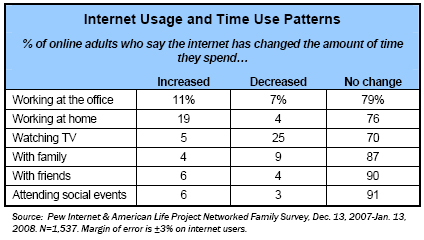
Cell phones and the internet are seen as positive tools for improving the quality of communications with family members, particularly those who live elsewhere.
Most respondents see the internet and cell phones as a positive (or, at worst, negligible) influence on the quality of communications with friends, family and co-workers.7 The internet and cell phones have the greatest positive impact on the quality of communications with family members living elsewhere, and the smallest positive impact on work-related communications. Notably, about half of the respondents in our survey feel that new communication technologies have not had an impact on their communications with household members, family members elsewhere, friends and coworkers. However, only a small percentage of adults feel that these technologies actually decrease the quality of their communications.
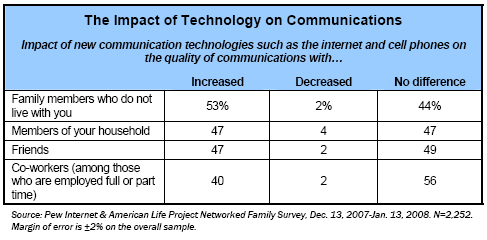
Most adults consider their family today to be as close, or closer, than the family they grew up in as children thanks to the internet and cell phones.
One-quarter of adults (25%) feel that the internet and cell phones have brought their family closer together than their own family was when they were growing up. Six in ten (60%) feel that these technologies haven’t made much difference in this regard, and only one-tenth (11%) feel that their family today is not as close as their childhood family because of new technologies. Families with the most technology – at least one cell phone and an internet connection – are relatively more likely to say their family is closer because of these technologies than are families with low levels of technology use.
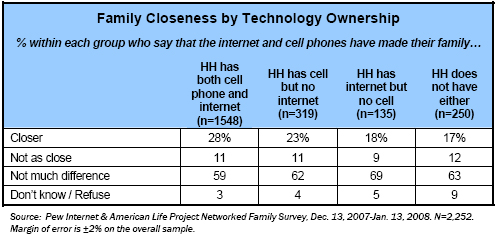
Younger Americans, having spent much of their teens and early adulthood in a world of cell phones and internet access, tend to see little difference in the closeness of their current and childhood families. Two-thirds of 18-29 year olds and 62% of 30-49 year olds say that the internet and cell phones have not made much difference in how close their family is now compared with the one they grew up in. This drops to 55% for individuals age 65 or older.


